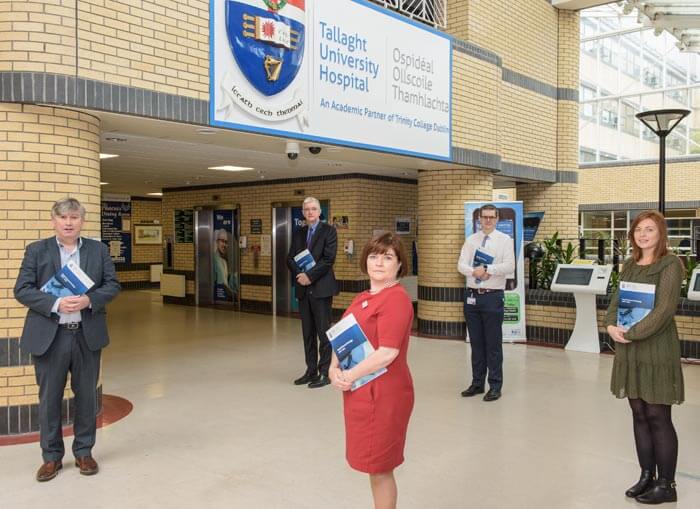Tallaght University Hospital (TUH) has published a five year hospital wide research strategy, to encourage and foster hospital led creativity and innovation supporting the overall hospital strategy published last year.

The strategy identifies five priority areas with key targets set for delivering each element of the strategy.
The five key areas are: Leadership & Governance; Research Impact & Community Engagement; Staff Participation & Talent; Research Partnerships and Funding.
Commenting on the publication of the strategy Lucy Nugent, Chief Executive of TUH said, “There is an important link between research and innovation and we work hard to be at the forefront of translational research that adds value to patient care. This strategy focusses on building structures and systems that direct, encourage and sustain impactful research. In these turbulent times, it is important that our research efforts are underpinned by a clear strategy which is also adaptive and dynamic in response to the unforeseen such as the COVID-19 pandemic. Such events also present opportunities to contribute to merging bodies of evidence and understanding. Our commitment to research is, I am pleased to say, matched by our patients’ willingness and enthusiasm to participate in clinical studies and we are enormously grateful for that support.”
The hospital said, “Medical innovation promises new ways to prevent, diagnose, treat and monitor health problems, as well as develop new medications and devices to manage and cure diseases. Medical innovation will also help in increasing knowledge and changing existing processes to better serve the changing needs and expectations of patients and staff. The context within which the Hospital delivers healthcare is increasingly complex and challenging. Technological innovations, the challenge of environmental changes, the changing demographic patterns within our local catchment and other external factors are all shaping the way healthcare will be delivered in the future. TUH is well placed to respond to these challenges, driving innovation and create news ways of caring for people to live better lives.”
Commenting on the strategy John Kelly, Deputy CEO and the person tasked with overseeing the implementation of the strategy said: “Innovation will help with problem solving and provide creative insight that will empower our staff to look at things from a different perspective, regardless of whether we are changing a process, developing a new product or finding a new way to stay competitive. The vision for TUH is to become a magnet hospital for innovation, where public sector and private industry identify this hospital as a leader in healthcare innovation. We are looking forward to working with Trinity College Dublin, the Hospital Foundations and other partners in achieving this strategy.”
Research Background
The research strategy builds on the strong tradition of clinical research in the original base hospitals upon which TUH was founded. This continues today through the work of the Meath Foundation through the funding of Healthcare Research & Quality Improvement projects as well as funding the Meath Foundation Clinical Research Laboratory and The Adelaide Health Foundation which funds hospital and community patient initiatives. Both institutions enshrine the principle of better patient care through research. They have recently been joined by the TUH Foundation the objective of which is to support patient care through technological innovation. Research lies at the heart of TUH’s drive to deliver improved patient care and enhance the health and wellbeing of our population.
TUH has a long track record of research across the medical and surgical specialties. This includes the specialties of: Gastroenterology, Dermatology, Vascular Neurology & Stroke, Gerontology, Immunology, Respiratory Disease, Urology, Orthopaedics and General Surgery.
TUH research is also internationally recognised in several areas including Irritable Bowel Disease, Vasculitis, Carotid Artery Disease and Sarcoidosis. There is a strong ethos of collaboration across specialities and an emphasis on clinical and translational research for practical patient benefit.

